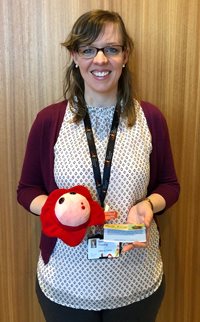August 13, 2018 Print
Postdoctoral researcher Naomi Truong has received an award for her presentation at the 43rd annual International Herpesvirus Workshop in Vancouver.
She presented her research on the relationship between dendritic cells found in the skin and the herpes simplex virus (HSV).
“Previously, we showed that Langerhans cells, a type of epidermal dendritic cell, become infected with HSV,” Naomi said.
 Naomi with part of her award - a plush version of a cold sore!
Naomi with part of her award - a plush version of a cold sore!
“We have now found that there is as second type that also becomes infected.
“We’re investigating how the virus is “relayed” through these dendritic cells and passed on to other immune cells.”
HSV is extremely common, with an estimated 3.7 billion worldwide infected with HSV-1 and 417 million with HSV-2. While symptoms, including blisters known as ‘cold sores’, are mild for most individuals, certain groups may have more severe side effects.
“Most people with HSV will have mild symptoms or no symptoms at all. However, HSV can cause complications for newborns and patients with weakened immune systems,” Naomi explained.
“Genital HSV-2 infection has also been shown to facilitate HIV infection.”
Naomi hopes that understanding how the virus is passed through immune cells will help identify targets that could be used in vaccine development.
“Currently, there is no cure for HSV, and medications are not preventative. A vaccine could prevent at-risk groups from suffering potential complications of the virus, and also reduce rates of HIV infection,” she said.
Naomi was one of just two junior investigators to receive an award for a presentation. She found the award to be very encouraging.
“It’s the first time I’ve presented a talk at an international meeting, let alone won a prize so it’s very exciting,” she said.
“It’s encouraging that the work we’re doing is valued by other researchers. I look forward to having the opportunity to present my work again.”
Well done, Naomi!